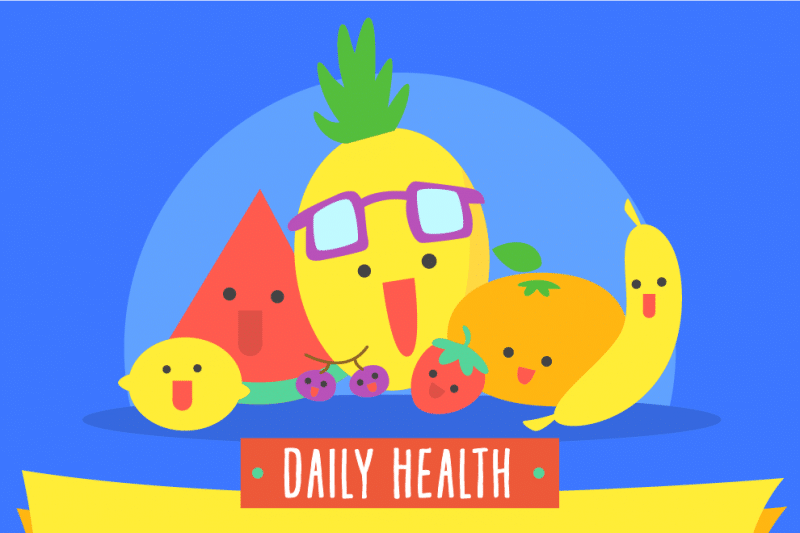The World of Vitamins (Infographic)

The problem with a lot of the food we eat today is that most of the goodness is processed out. They taste great, but once you know the facts about vitamins and how important they are for health, you’ll realize just how much these foods are robbing you of essential micronutrients.
We’ve created the following vitamins infographic to provide you with all the necessary information in an easy-to-digest form. In it, you’ll discover:
- What are vitamins
- The uses of all vitamins
- The signs and symptoms of their deficiency
- The minimum intake for males and females
- The natural sources of vitamins
- What foods have the most vitamins
- How you can boost your vitamin intake
- Whether you should consider taking a supplement
- Which vitamins to take daily
- Whether or not they help
- What side-effects multivitamins might have
- Some fun facts
If you want to learn even more, take a look at our series of articles that offer in-depth coverage of everything you need to know about vitamins, including the best food sources of vitamins to add to your diet.
- 25 Vitamin A Foods That Will Boost Your Health
- 20 Vitamin B1 Foods You Should Include in Your Diet
- 20 Vitamin B2 Foods Essential for Your Well-Being
- 20 Vitamin B3 Foods You Should Add to Your Daily Menu
- 25 Vitamin B5 Foods for Staying Healthy & Energetic
- 20 Vitamin B6 Foods for a Healthy Brain
- 20 Vitamin B7 Foods for a Balanced Diet
- 25 Vitamin B9 Foods Great for Physical & Mental Health
- 20 Vitamin B12 Foods to Feel Positive & Energetic
- 25 Vitamin C Foods That Will Boost Your Immune System
- 20 Vitamin D Foods for Strong & Healthy Bones
- 20 Vitamin E Foods for Fighting Against Free Radicals
- 20 Vitamin K Foods That Should Be Part of Your Diet
What Are the 13 Vitamins Your Body Needs?
Vitamins are essential organic compounds needed in small quantities for our bodies to function properly. We need to ingest specific amounts of vitamins daily, usually through our diet, because our bodies produce insufficient amounts of them, or more often, they don’t produce them at all. Children and older adults especially have to make sure they are getting enough of them.
What is the best natural vitamin? There are 13 vitamins overall, and they all have different functions. They are:
- vitamin A
- vitamin B1
- vitamin B2
- vitamin B3
- vitamin B5
- vitamin B6
- vitamin B7
- vitamin B9
- vitamin B12
- vitamin C
- vitamin D
- vitamin E
- vitamin K
To maintain optimal health, you need to ensure that your diet contains enough of the micronutrients listed above. Sourcing natural vitamins from the food you eat should be your priority. That means eating a diet rich in whole foods that are minimally processed. You’ll also have to vary the foods you eat to get a good balance of these micronutrients.
As for the best time of day to take vitamins, morning is ideal for multivitamins and any B vitamins. Multivitamins work best if taken early in the day because the B vitamins in them may accelerate metabolism and brain function too much for a peaceful evening or before bed.
Vitamins Rich Food
Before we move onto that topic, we need to understand that vitamins can be divided into two basic categories: water-soluble (B vitamins and vitamin C) or fat-soluble (vitamins A, D, E, and K). The difference is vital for your health. When looking into fat vs. water–soluble vitamins, water-soluble vitamins are eliminated quickly from the body, whereas fat-soluble vitamins can be retained in tissues. As their name suggests, fat-soluble vitamins dissolve in fat.
The fat-soluble vitamins absorption requires fat to be absorbed, which is usually obtained from stomach food. Toxicity is more common in fat-soluble vitamins, while it can also happen with water-soluble vitamins. It would help if you were wary of the deficiencies of the former and the toxic levels that might build up of the latter.
Suppose you need a supplement to help you cope with stress, so you take B vitamins. As these are water-soluble, taking large doses is not going to harm you. With water-soluble vitamins, the body uses what it can and excretes the rest. So, you can expect to have a larger pee volume and a bit more work for your kidneys, but there won’t be any lasting adverse side effects.
On the other hand, let’s say that your immunity could be better, and you’ve decided that it’s because you don’t get enough sun exposure. You might want to up your intake of foods with vitamins D and E and consider supplementing them, too.
This could be problematic as these are fat-soluble nutrients. What happens here is that any excess is stored in the body’s fatty tissue and liver. Over time, the residue could build up to toxic levels. So taking them in excess could harm you over time.
Water-Soluble Vitamins
The first group comprises all B vitamins and vitamin C. There are eight B vitamins in total that are sometimes manufactured as a B complex vitamins supplement. We’ll give you the breakdown of each of those vitamins, what they do, where you can find them, how much you need, and the signs and symptoms of their deficiency.
Vitamin B1 (Thiamine)
Food sources include:
- marmite
- sunflower seeds
- macadamia nuts
- soy beans
- trout
For men aged 19 and over, the Recommended Dietary Allowance (RDA) is 1.2 mg per day, while for women aged 19 and over, it is 1.1 mg per day. The dose is increased to 1.4 mg per day during pregnancy and breastfeeding.
This is one of the B vitamins for energy. We also need vitamin B1 for proper nerve and muscle function. Thiamine tops the list of vitamins for depression. You may be deficient if you have:
- bad coordination
- a low mood
- fatigue for no good reason
Vitamin B2 (Riboflavin)
Food sources include:
- liver
- almonds
- eggs
- salmon
- mushrooms
Men (ages 19 to 50) require around 1.3 mg of riboflavin per day, and women at the same age—1.1 mg per day. The dose is increased to 1.4 mg per day during pregnancy and 1.6 mg per day during breastfeeding.
This is also one of the B vitamins for hair. We need vitamin B2 to make new red blood cells and provide energy for the muscles. So, riboflavin is a part of all vitamins for energy that you might take.
You may be deficient if you have:
- dry or cracked lips, especially if the corners are cracked
- sensitivity to light
- a sore throat but no cold
Vitamin B3 (Niacin)
Food sources include:
- yellowfin tuna
- mushrooms
- peanuts
- sunflower seeds
- green peas
Men (ages 19 and older) require around 16 mg of niacin per day, and women at the same age—14 mg per day. The dose is increased to 18 mg per day during pregnancy and 17 mg per day during breastfeeding.
Many water-soluble vitamins foods contain lots of different B vitamins in the same food. We need vitamin B3 to metabolize fat and glucose. Moreover, niacin helps reduce the levels of bad cholesterol in the blood.
You may be deficient if you have:
- indigestion
- canker sores
- fatigue
Vitamin B5 (Pantothenic Acid)
The vitamins chart notes the following food sources:
- sunflower seeds
- trout
- eggs
- mushrooms
- avocados
Adults (ages 19 and older) require around 5 mg of B5 per day. The dose is increased to 6 mg per day during pregnancy and 7 mg per day during breastfeeding.
We need vitamin B5 to oxidize fatty acids and carbs. It assists with the formation of red blood cells and ensures that the adrenal glands function optimally. Pantothenic acid is an excellent addition to vitamins for anxiety.
You may be deficient if you have:
- stomach pains
- insomnia
- fatigue
Vitamin B6 (Pyridoxine)
Food sources include:
- sunflower seeds
- tuna
- pistachios
- dried prunes
- bananas
According to facts about vitamins, adults (ages 19–50) require around 1.3 mg of B6 per day. The dose is increased to 1.9 mg per day during pregnancy and 2 mg per day during breastfeeding.
We need vitamin B6 to build new red blood cells and detoxify the liver. It is also essential for the healthy functioning of your nervous system. Pyridoxine is a good choice of vitamins for memory.
You may be deficient if you have:
- dermatitis with cheilosis
- microcytic anemia
- a swollen tongue
Vitamin B7 (Biotin)
Food sources include:
- eggs
- salmon
- strawberries
- sweet potato
- broccoli
Adults and pregnant women aged 19+ need 30 mcg of biotin a day while breastfeeding women need 35 mcg. We need vitamin B7 to metabolize lipids, proteins, and carbs. Biotin is one of the top vitamins for hair and skin.
You may be deficient if you have:
- hair loss
- a rash around the genitals or on your face
- hallucinations
Vitamin B9 (Folate)
Food sources include:
- black-eyed peas
- lentils
- asparagus
- romaine lettuce
Adults aged 19+ need 400 mcg a day, while the dose is increased to 600 mcg per day during pregnancy and 500 mcg per day during breastfeeding. We need vitamin B9 to help with the formation of red blood cells. Folate is one of the essential prenatal vitamins and aids in developing the baby’s central nervous system.
You may be deficient if you have:
- anemia
- poor immune function
- low energy levels
- bad digestion
Vitamin B12 (Cobalamin)
Food sources include:
- clams
- mackerel
- trout
- eggs
- tofu
We need up to 2.4 mcg a day. The dose is increased to 2.6 mcg per day during pregnancy and 2.8 mcg per day during breastfeeding. B12 is considered one of the vitamins for the brain and memory. We need vitamin B12 to metabolize macronutrients and to form red blood cells. Cobalamin is one of the vitamins in foods of animal origin only.
You may be deficient if you have:
- trouble walking
- numbness or tingling in the limbs
Vitamin C (Ascorbic Acid)
Food sources include:
- guavas
- bell peppers
- kale
- kiwi fruit
- broccoli
Men aged 19 and older need 90 mg a day, and women of the same age need 75 mg a day. That dose increases to 85 mg per day during pregnancy and 120 mg per day during breastfeeding.
Facts about vitamin C reveal that vitamin C helps to boost immunity. And that’s especially when it comes to common colds and flu. Moreover, it is one of the vitamins for healthy skin. Ascorbic acid also improves blood circulation and helps prevent scurvy. Of all the vitamins and minerals, this is the one that’s probably the easiest to get your daily dose of.
You may be deficient if you have:
- dry, splitting hair
- easy bruising
- gingivitis
Fat-Soluble Vitamins
Let’s move on to the second group of vitamins. Here, we will look at the nutrients you need to monitor your intake, counting in any supplements you might take and your food-based vitamins.
Vitamin A (Retinol)
Food sources include:
- cod liver oil
- liver
- sweet potatoes
- carrots
- broccoli leaf
Men need 900 mcg a day, and women need 700 mcg a day. The dose is increased to 750 mcg for pregnant teens and 770 mcg for pregnant adults. Furthermore, teens who breastfeed need 1,200 mcg retinol, while adults who breastfeed need 1,300 mcg per day.
Interesting facts about vitamins find that vitamin A is essential for good skeletal and teeth health. It is also critical for your immunity. Moreover, retinol is one of the essential vitamins for the eyes and vitamins for hair and nails.
You may be deficient if you have:
- colds or the flu often
- xerophthalmia
- bad skin
Vitamins D2 (Ergocalciferol) and D3 (Cholecalciferol)
Food sources include:
- salmon
- cremini mushrooms
- breakfast cereal
- tofu
- eggs
Adults aged 19–70(including pregnant and breastfeeding teens and women) need 15 mcg a day. Vitamin D is also one of the vitamins for hair loss. Moreover, it helps keep your bones strong and healthy and boosts immunity. It is one of the best vitamins for men who train a lot and postmenopausal women who need to maintain bone density.
The sunshine vitamin is named so because your body can make it as long as you get at least 15 minutes of sun exposure a day. Facts about vitamin D reveal that it’s the only vitamin we can produce on our own.
There are two types of vitamin D — vitamin D2 (ergocalciferol) and vitamin D3 (cholecalciferol). And they are one of the best vitamins for anxiety and panic attacks. You may be deficient if you have:
- back or skeletal pains
- chronic fatigue
Vitamin E (Alpha-Tocopherol)
Food sources include:
- wheat germ oil
- sunflower seeds
- almonds
- hazelnut oil
Adults and pregnant women need 15 mg a day. The dose is increased to 19 mg per day during breastfeeding. Vitamin E helps keep cholesterol in check and boosts your immunity. Alpha-tocopherol is one of the natural vitamins you can overdose on, so be sure to consume it according to your doctor’s and the manufacturer’s instructions.
You may be deficient if you have:
- had gastric bypass surgery
- cystic fibrosis
- crohn’s disease
Vitamins K1(Phylloquinone) and K2 (Menaquinone)
Food sources include:
- kale
- mustard greens
- broccoli
- spinach
- soybean oil
Men need 120 mcg a day, and women (including pregnant and breastfeeding) need 90 mcg a day. Vitamin K is necessary for proper blood clotting and bone health. Our first K vitamins source comes in the form of an injection administered shortly after birth to prevent the hemorrhagic disease of the newborn.
There are two forms of vitamin K—vitamin K1 (phylloquinone) and vitamin K2 (menaquinone). Vitamins facts note that the good bacteria in our gut flora can convert K1 into K2. You may be deficient if you have:
- spontaneous bruising
- heavy menstrual flow
- internal bleeding
Top Prenatal Vitamins
There are numerous brands of prenatal vitamins to pick from. However, you should always look for natural prenatal vitamins that contain the following:
- iron
- calcium
- vitamin B12
- vitamins C, A, D, and E
- zinc
- folate (folic acid)
- copper
- magnesium
There are many benefits of prenatal vitamins:
- Folic acid aids in the proper development of your baby’s brain and spinal cord. Spina bifida and anencephaly are significant birth abnormalities that can be prevented with this vitamin.
- Iron aids in the delivery of oxygen to your baby through your blood. It may also help you avoid having a premature or small baby, as the facts about vitamins show.
- Calcium helps to protect your baby’s bones as they grow. This essential mineral is taken from your bones and teeth by your infant. If you don’t take extra calcium while your infant grows, you risk losing bone density.
Moreover, prenatal vitamins are high in folic acid, a B vitamin that promotes healthy cell growth, and is one of the essential prenatal vitamins for hair, skin, and nails.
Final Notes
Staying in touch with your body and listening to what it has to say is crucial to living a healthy lifestyle. When it comes to nutrition, make sure you strive to consume all of the necessary nutrients to remain energized and nourished. We hope that you’ve enjoyed this post and learned a lot of new scientific facts about vitamins. Here’s to your good health!
FAQs
Which fruit contains which vitamin?
Most fruits are healthy and packed with a range of vitamins. Citrus and strawberries, for example, contain vitamin C. If you want to improve your nutrition, fruits are an excellent way to start. Not only do they provide healthy fiber and a lot of water, but they are also foods rich in vitamins and minerals. Just be aware that they can contain a lot of natural sugar too.
Do multivitamins work?
That depends on the quality of the ingredients used. Make sure to do your research here. Cheaper products may contain more filler than anything else or use more affordable, less bioavailable nutrients. If that’s the case, then no, they’re not going to work all that well.
If you opt for a better quality product from a reputable brand and use that to enhance the nutrition from vitamin-rich foods, yes, it will give you a nicely rounded nutrient profile. Do take note of the instructions regarding when to take them and how to take them to get the best results.
Is it good to take a multivitamin every day?
These supplements are designed to be taken daily. You have to take them consistently for them to do any good. Besides that, to see real benefits and reverse past deficiencies, you’ll need to take them for at least three to six months. After that, it will have become a habit anyway.
If you are a relatively healthy person and follow a good diet, you might be better off supplementing with the vitamins you need instead of consuming a multivitamin. A good all-rounder is necessary to complete good nutrition and help chronically ill or malnourished people.
Do multivitamins have side effects?
For the most part, if you take them correctly, they shouldn’t have. You might expect gastrointestinal upsets when first taking them, but these should pass over time. Some vitamins and supplements can have unexpected effects, like making you feel hungrier.
In general, we’d suggest that you research any supplement you’re planning to take before taking it. When in doubt, speak to your doctor or pharmacist. As with all things, there is a possibility that you might be sensitive or allergic to the ingredients used. So, if you break out in a rash or the gastrointestinal upsets are severe or long-lasting, you may need to switch.
Are vitamins worth it?
In an ideal world, supplements are nice to have but not essential. So, there is an endless debate about whether or not you should stick to foods that contain vitamins or pay over your hard-earned money for a supplement.
But, unless you can grow your own food or source it from people using sound farming practices, you face the sad truth. And that is that you’re probably not going to get the best vitamins you need from food alone.
That said, not all supplements are created equal. Stick with reputable brands and avoid being caught up in any of the latest fads. Instead of getting drawn into the marketing hype surrounding the newest cure-all, stick to the tried and tested supplements instead of getting drawn into the marketing hype.
What are the 5 most important vitamins?
The five vitamins that have a higher risk of being under-consumed are:
- vitamin B12 (found in fish, meat, eggs, milk)
- vitamin B9 (found in green vegetables, fruit, legumes)
- vitamin D (also one of the natural vitamins for energy, found in salmon, sardines, tuna, mushrooms)
- vitamin B6 (found in bananas, chicken, baked potatoes)
- vitamin A (found in carrots, spinach, broccoli, sweet potatoes)
What vitamins help hair grow?
Biotin is one of the best vitamins for hair growth. Because it’s a water-soluble B vitamin, any excess will pass through your urine. It is suggested that you take between 3 and 5 milligrams every day.
What is the difference between natural and synthetic vitamins?
Generally speaking, dietary supplements manufactured artificially in a laboratory or industrial method are known as synthetic nutrients. Nutrients present in whole foods are known as natural nutrients. Many people don’t acquire enough nutrition just from eating. Over half of the population in the United States currently consumes synthetic nutrients such as multivitamins.
How can I get vitamin D naturally?
There are several ways you can make sure you get vitamin D, and they are:
- spending time in the sun
- eating fatty fish and seafood
- mushrooms
- egg yolks
- fortified foods
- include a vitamin D supplement
- using a UV lamp
What is the best vitamin for your body?
Minerals and vitamins, along with other nutrients like proteins, carbs, and dietary fats, help our bodies grow and thrive. Facts about vitamins and minerals find the following ten vitamins and minerals are the most vital ones for our body:
- vitamin B
- vitamin C
- vitamin E
- vitamin A
- vitamin K
- vitamin D
- calcium
- iron
- magnesium
- zinc
Why do we need vitamins?
Vitamins are protective compounds that are required for the proper functioning of your body. Vitamins help to strengthen your immune system and keep you healthy. Our bodies do not create all of the vitamins we require naturally except for vitamins D and K. Facts about vitamins suggest you must eat particular food to receive your daily dose of these nutrients.







